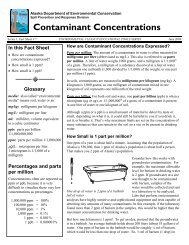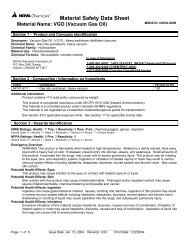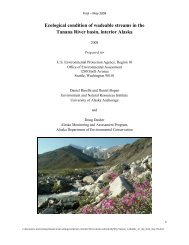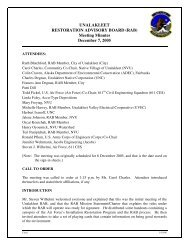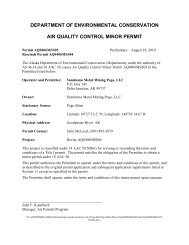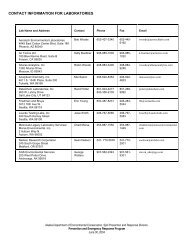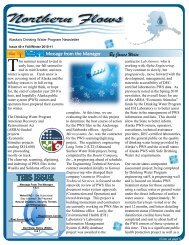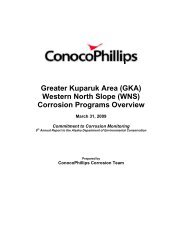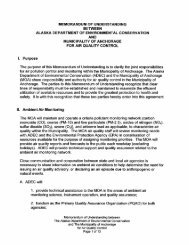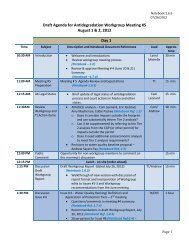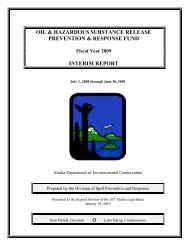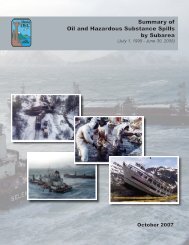2012 Ocean Ranger Guidebook Revision 3-7-12 - Alaska ...
2012 Ocean Ranger Guidebook Revision 3-7-12 - Alaska ...
2012 Ocean Ranger Guidebook Revision 3-7-12 - Alaska ...
You also want an ePaper? Increase the reach of your titles
YUMPU automatically turns print PDFs into web optimized ePapers that Google loves.
<strong>20<strong>12</strong></strong> <strong>Ocean</strong> <strong>Ranger</strong> <strong>Guidebook</strong> 3-7-<strong>12</strong><br />
(2) Discharged to a reception facility. If the reception facility is in a port or terminal in the United States,<br />
each person who is in charge of each oceangoing tanker or any other oceangoing ship of 400 gross tons<br />
or more shall notify the port or terminal, at least 24 hours before entering the port or terminal, of—<br />
(i) The estimated time of day the ship will discharge oily mixtures;<br />
(ii) The type of oily mixtures to be discharged; and<br />
(iii) The volume of oily mixtures to be discharged.<br />
Note: There are Federal, state, or local laws or regulations that could require a written description of the oil residues and oily<br />
mixtures to be discharged. For example, a residue or mixture containing oil might have a flashpoint less than 60 °C (140 °F) and<br />
thus have the characteristic of ignitability under 40 CFR261.21, which might require a description of the waste for a manifest<br />
under 40 CFR Part 262, subpart B. Occupational safety and health concerns may be covered, as well as environmental ones.<br />
The notice required in this section is in addition to those required by other Federal, state, and local laws and regulations.<br />
Affected persons should contact the appropriate Federal, state, or local agency to determine whether other notice and<br />
information requirements, including 40 CFR Parts 262 and 263, apply to them.<br />
(g) No discharge into the sea shall contain chemicals or other substances introduced for the purpose of<br />
circumventing the conditions of discharge specified in this regulation.<br />
Definitions (federal- 33CFR 151.05):<br />
Oil means petroleum whether in solid, semi-solid, emulsified, or liquid form,<br />
including but not limited to, crude oil, fuel oil, sludge, oil refuse, oil residue, and refined products, and, without<br />
limiting the generality of the foregoing, includes the substances listed in Appendix I of Annex I of MARPOL 73/78.<br />
“Oil” does not include animal and vegetable based oil or noxious liquid substances (NLS) designated under Annex II<br />
of MARPOL 73/78.<br />
Oily mixture means a mixture, in any form, with any oil content. “Oily mixture” includes, but is not limited to—<br />
(1) Slops from bilges;<br />
(2) Slops from oil cargoes (such as cargo tank washings, oily waste, and oily refuse);<br />
(3) Oil residue; and<br />
(4) Oily ballast water from cargo or fuel oil tanks.<br />
Discharge means any release, however caused, from a ship and includes any escape, disposal, spilling, leaking,<br />
pumping, emitting or emptying. It does not include—<br />
(1) Dumping within the meaning of the Convention on the Prevention of Marine<br />
Pollution by Dumping of Wastes and Other Matter, done at London on 13November 1972; or<br />
(2) Release of oil or oily mixtures directly arising from the exploration, exploitation<br />
and associated off-shore processing of sea-bed mineral resources.<br />
Oil Record Book: ORB<br />
See included “Example of ORB pages large cruise vessel” “Example of typical Bunker Receipt”.<br />
Vessels offload sludge oil. In most cases the offloads are in Victoria or Vancouver BC (Canada).<br />
Vessels generally do not use the OWS system to discharge in <strong>Alaska</strong> waters.<br />
Oil Record Book (ORB) shall be kept updated on board of the vessel. This record should provide<br />
a clear set out of the oil handling, sludge handling and all oil discharges.<br />
The ORB is in most cases kept in the Engine Control Room (ECR) and should be updated as<br />
operations are completed. In the ORB are letter codes and item numbers. These letter code /<br />
item numbers “explain” which operations took place. These codes are required by the IMO<br />
regulations.<br />
FORM A (as it is on board) should include or reference “Means for retention and disposal of oil<br />
residues (sludge) regulation 17 and bilge water holding tanks”. This is very helpful information<br />
because it tells the OR what tanks / systems are available.<br />
195



